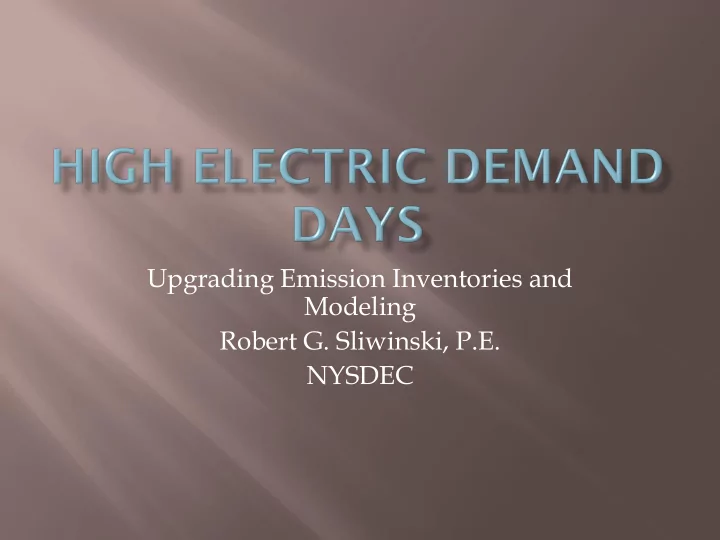

Upgrading Emission Inventories and Modeling Robert G. Sliwinski, P.E. NYSDEC
OTC High Electric Demand Day (HEDD) Initiative Update on NYSDEC’s Actions to Reduce NOx Emissions on HEDD Accounting for HEDD Emissions in Air Quality Models
Revisions to NOx RACT rule (Subpart 227-2) Turbines and Load-following Boilers Under Review by Governor’s Office of Regulatory Reform Distributed Generation Rule (Part 222) New rule – still under development Existing DG – sources not covered by Subpart 227-2 New DG – ALL new DG not otherwise subject to NSR
Energy Efficiency Portfolio Standard (aka 15 x 15 Initiative) Initial Order by the Public Service Commission: 6/23/08 Covers period through 2011 Second Phase of Working Groups: July – November 2008 Additional PSC Orders have been issued: workforce training, natural gas efficiency, etc. Environmental Justice Study Spin-off from EEPS Working Group VIII Evaluated Potential for Demand Response to Offset Generation from Peaking Turbines Report submitted to PSC on May 27, 2009 Demand Response Initiative (Zone J – Con Ed) Expand DR in NYC – PSC Order Expected 10/15/09 Reduce System Peak – 100 hours/year of peak demand Reduce energy and capacity payments Reduce emissions from peaking turbines located near potential EJ communities
Stakeholders: Power producers, NYISO, EPA, environmental groups, EPA, DEC…. Two Issues Discussed regarding HEDD Emissions: 1. Need for reliable methodologies for determining HEDD emissions. 2. Need to develop techniques for estimating future year emission inventories for planning and modeling.
Ozone Season Day (OSD) = “Typical Summer Day” High Electric Demand Days Occur several days after the start of a heat wave High relative humidity Electrical demand for air conditioning Peaking turbines not included in the predictive electricity generation models. Demand response engines not considered in the emissions estimates for an OSD.
Work being conducted by NJDEP. Modeling: Base year: 2005 Meteorology CAMD Data National Emissions Inventory Data Results Due: December 31, 2009
Four Recommended HEDD Simulations Run #1 - 2007 base case using CAMD hourly data rather than SMOKE profiles to allocate annual emissions. Run #2 - 2007 base case using SMOKE profiles to allocate annual emissions. Run #3 - Run #1 with all major HEDD units turned off. Run #4 – Run #3 with displaced capacity redistributed.
Recommend
More recommend